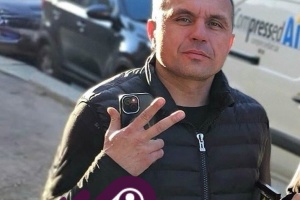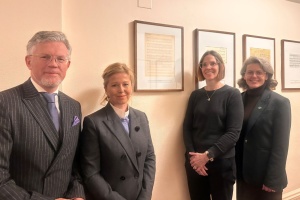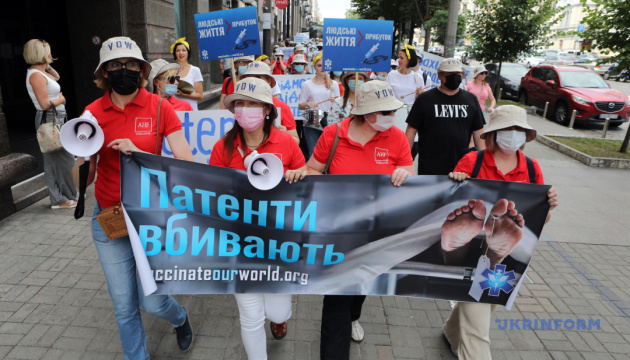
Vaccinate our world: a fight for the access to life-saving vaccines continues
Almost the whole world is concerned about the potential pandemic wave driven by the Delta Variant next autumn. Meanwhile, some of the countries are already loaded and ready.
Israel, for instance, has lifted almost all quarantine restrictions for people over the age of 16 less than 6 months after the start of the vaccination campaign (as of early of July, more than 55% of Israelis had received two doses of the vaccine), and began vaccinating adolescents in early June. In the United Kingdom, almost 50% of people were vaccinated in two stages, while 66% received at least the first dose.
At the same time, Eastern Europe can only dreams of such success. In Romania, according to government data, approximately 25% of citizens were vaccinated at least once. In Serbia, the current situation is hardly any better – given figure is 30%. In Ukraine, where vaccination started in February, as of July 6, slightly more than 2% of citizens have received two doses, while more than 5% – at least one. There was a lot of talk in the media about mistakes made by officials, which, among other things, resulted in this kind of situation in our country.
However, there were also global factors that led to this outcome. According to the AIDS Healthcare Foundation (AHF), world's biggest provider of HIV/AIDS care and treatment services, one of them was the problematic procurement of the COVID-19 vaccine. Eastern European and poor countries are not the only ones facing these problems; the rest of the world wants to overcome the pandemic as soon as possible and return to normal life without deaths, quarantine restrictions and economic damage as well. As a reaction to the insufficient rate and extremely low efficiency of vaccination campaigns in less developed countries, AHF Ukraine initiated the Global Advocacy Campaign “VOW. Vaccine our world.”
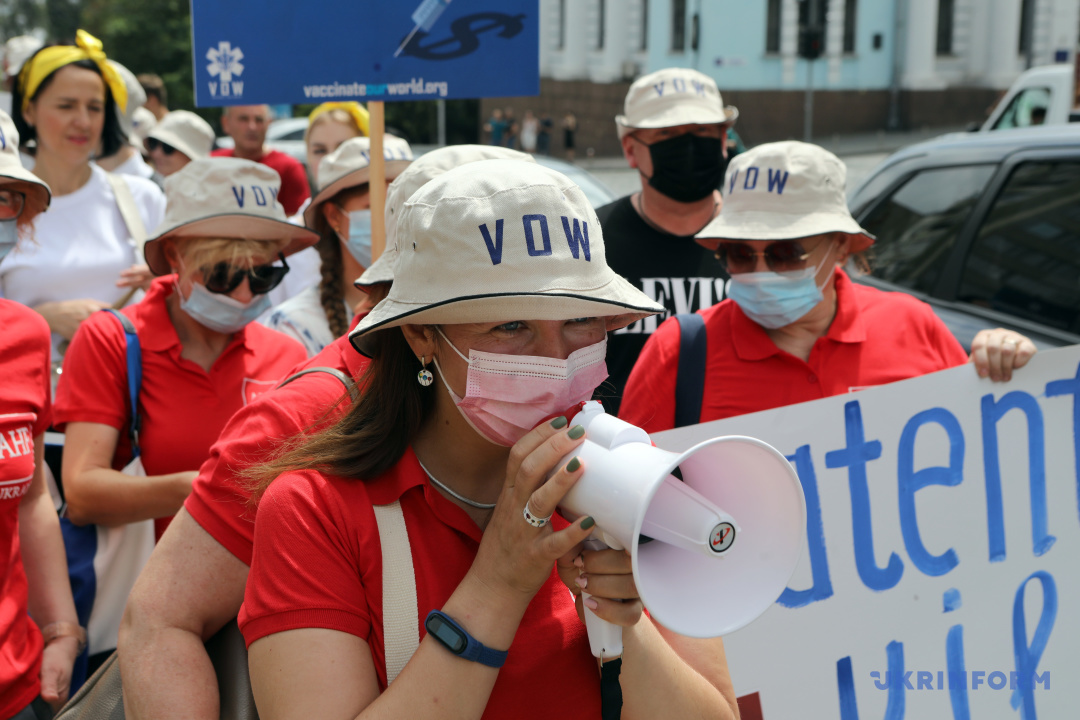
MARCHING FOR VACCINATION
According to the WHO, wealthy countries received more than 87% out of more than 700 million doses of vaccines administered worldwide, while poor countries received only 0.2%. The UK and the EU are some of the biggest hoarders of vaccines against COVID-19. According to the Duke Global Health Innovation Center’s latest data on vaccine procurement, EU countries have purchased twice as many vaccines as their population. The foundation believes that this situation should be resolved as soon as possible; Ignoring this problem will only contribute to the continuation of the pandemic, as new outbreaks are a prerequisite for the development of mutations resistant to vaccines. These drugs are not ordinary goods subjected to the rules of fair competition and commerce, but rather a strategic resource, and AHF believes they must be in open access for everyone. That is why we need to take action.
In mid-May, the AIDS Healthcare Foundation held Zoom conference in London, demanding global cooperation for vaccination against COVID-19. Public health activists and government officials from the UK, the EU, Africa and the United States have stood for fast and open access to vaccines, calling on the UK and the EU to support the Biden administration's initiative to suspend patents for COVID 19 vaccines.
"We are tired of the endless promises to be vaccinated eventually made by our governments. We don’t want to hear why it is impossible to keep them – there is no meaningful explanations when it comes to people's lives,” said Zoya Shabarova, Head of the European bureau of the AIDS Healthcare Foundation.
Vaccinate Our World’s campaign’s organizers suggested that countries need a new, large-scale wave of vaccination to prevent further waves of infection, and the suspension of intellectual property rights to COVID-19 vaccines are essential condition for that.
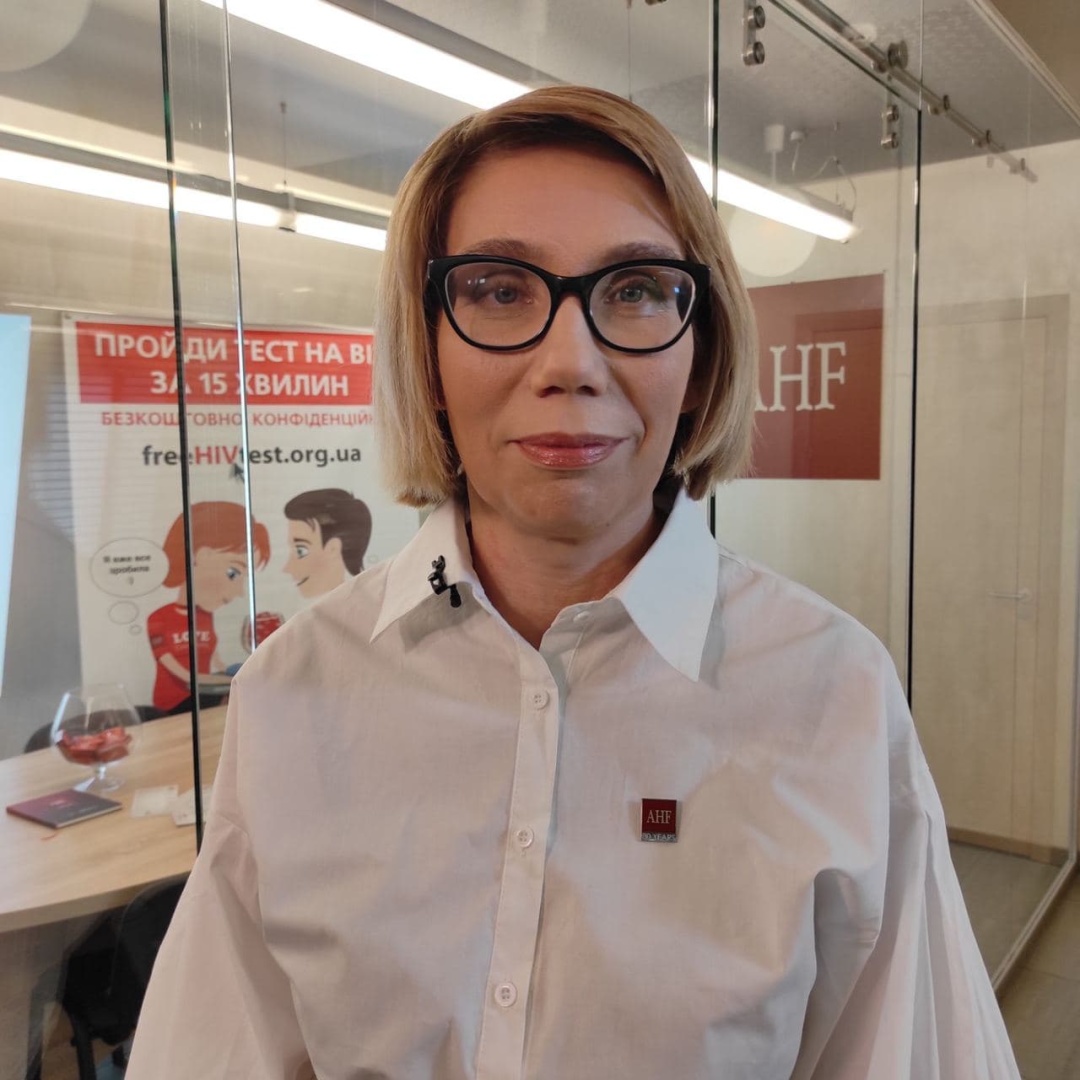
Yaroslava Lopatina / Photo: Kostiantyn Miliokhin
"Although the G7's announcement of a 1 billion COVID-19 vaccines donation to poorer countries is a step in the right direction, it is not enough to vaccinate our world. Wealthy countries’ leaders have to do more to ensure justice. Of course, large companies always have their own agenda, they care about profits and hold on to their patents, explains Yaroslava Lopatina, Head of AHF in Ukraine. However, we need enough vaccines so that the vaccination campaign would not last for years. New variants of the virus will emerge, and they might be resistant to existing vaccines. Therefore, the global task is to leave no country without access to vaccination and to vaccinate people as quickly and en masse as possible. In order to do so, we need to establish the production of the vaccine in different countries, waive current patents. Ukraine has the opportunity to produce the vaccine on its own territory, and if pharmaceutical companies disclose the technology, it will become possible.”
In early July, Kyiv hosted a march in support of the global initiative "VOW. Vaccinate our world," also organized by the AHF Ukraine. Activists lead a march from the German Embassy to the Delegation of the European Union to Ukraine’s offices, urging EU countries to bring Lopatina’s words to life and waive patent rights to COVID vaccines, or at least pass the surplus vaccines to those who need them more. It is too early to talk about the campaign’s success, but, on the other hand, no one is planning to stop it.
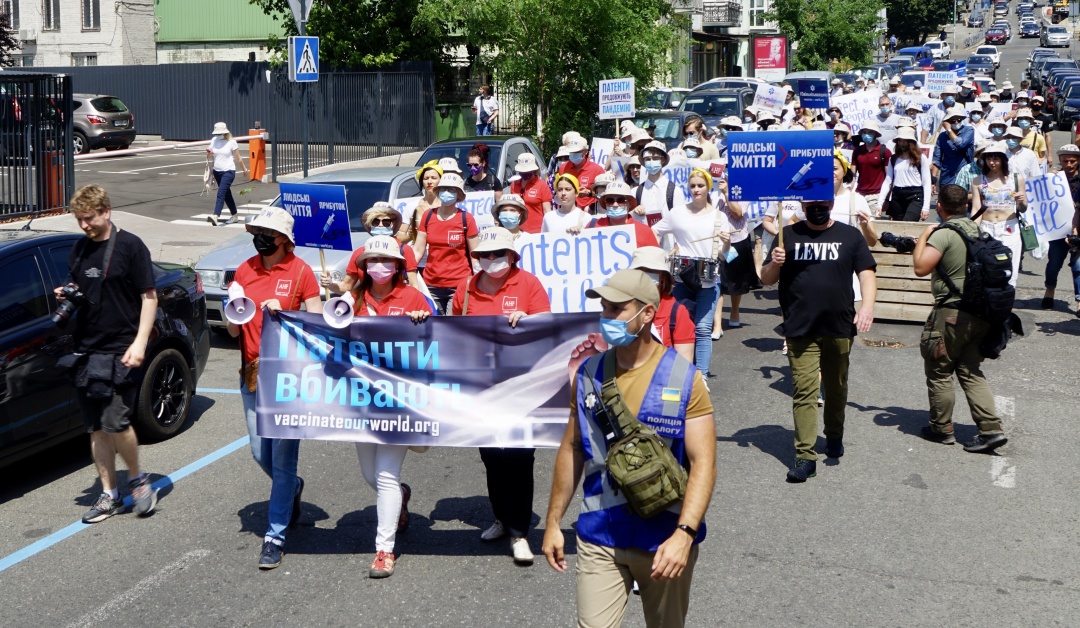
Photo: Kostiantyn Miliokhin
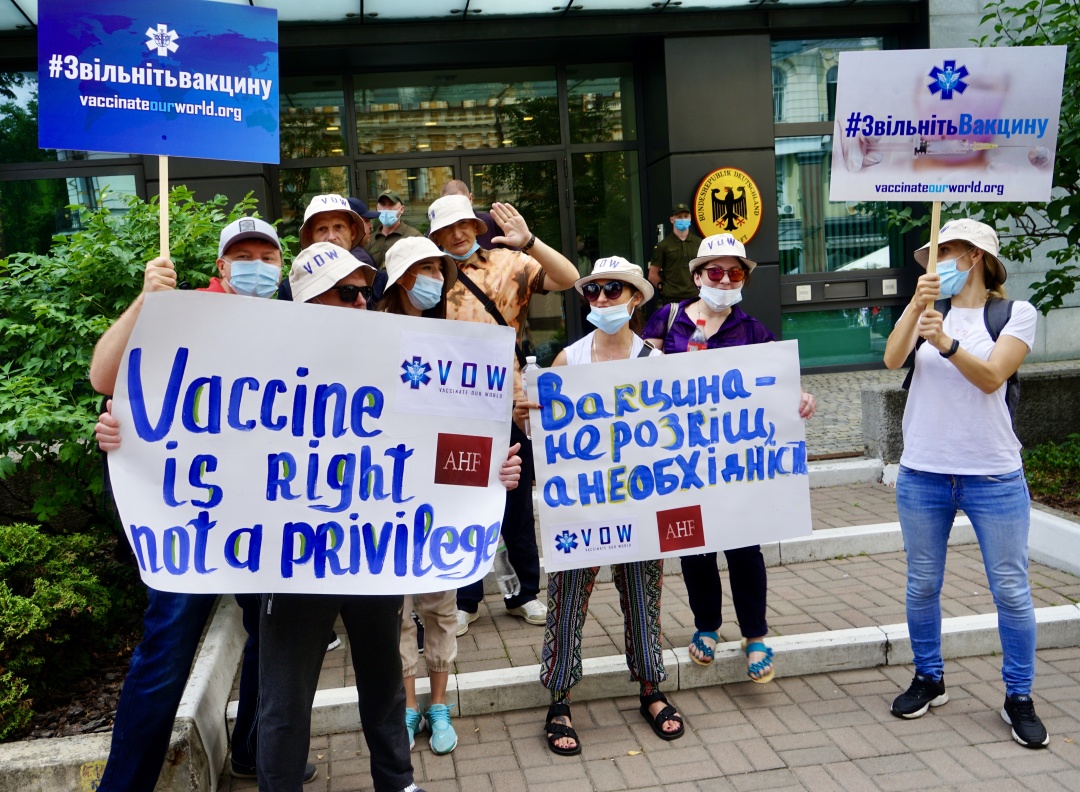
Photo: Kostiantyn Miliokhin
WHO CAN AFFECT THE DECISION?
More than 100 countries, including the United States and France, have already united efforts to support the World Trade Organization's proposal to renounce the protection of intellectual property for COVID-19 vaccines.
“The administration of US President Biden has taken an unprecedented step by supporting the WTO’s proposal to waive protection of intellectual property rights for vaccines against COVID-19 during a pandemic. If we really want to end the global pandemic, we need to urge the UK and the EU to follow the example,” said AHF’s founder and president Michael Weinstein during a video conference in May.
“Meanwhile, Germany and some other EU countries still refuse to approve an agreement that will help ensure access to vaccines for millions of people around the world,” added Lopatina. “At the same time, vaccine manufacturers don't really care to whom they sell; the only thing that matters to them is profit, and for the sake of it they will oppose the waiver of patents,” she said.
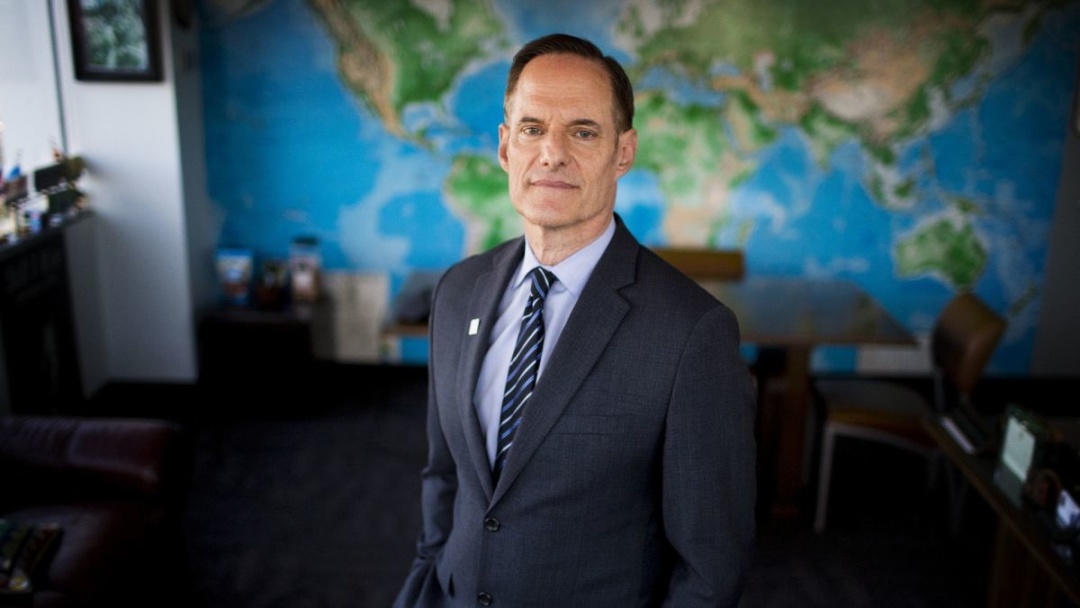
Michael Weinstein / Photo: Barbara Davidson / Los Angeles Times
Still, Ukraine hopes that the World Trade Organization will manage to come to an agreement on a temporary waiver of patents for the vaccine. Back in May, Ukraine's trade representative Taras Kachka claimed that the organization was about to make such a decision.
“Unequal access to vaccines is the world's greatest injustice that the WTO can solve if it decides to grant a waiver of intellectual property rights. This initiative was taken by the Republic of South Africa and India in the autumn. Today, it was supported by the US administration, according to USTR Catherine Ty. Usually, developed countries oppose such decisions. This would be a breakthrough for the WTO,” Kachka wrote on his Facebook page at the time. He promised that Ukraine would campaign for a swift solution, as “it is not a question of vaccine production, but rather of free access [...] to vaccines.” More than 100 countries with membership in the WHO support it, but, unfortunately, the World Trade Organization’s decisions are taken by consensus, i.e. all of the 164 member countries must vote in favor of it.
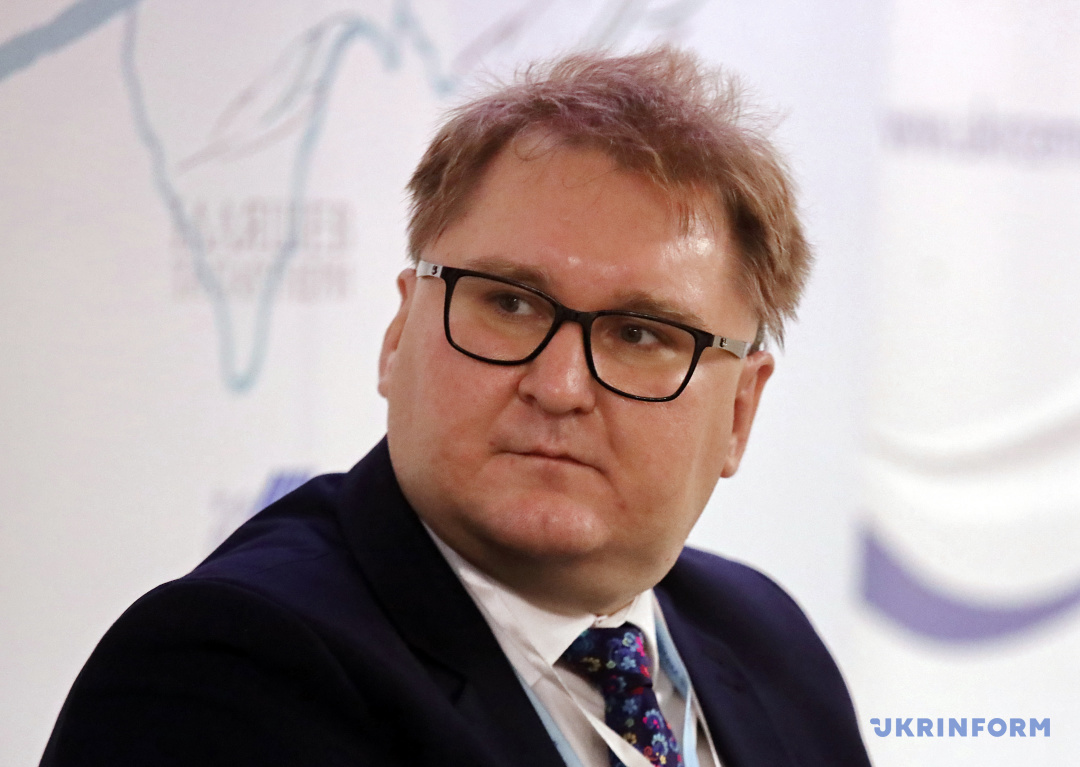
Taras Kachka
Ukraine supports the proposal of India and South Africa to temporarily waive intellectual property protection of products that are being used or can be used for the COVID-19 prevention and specific treatment (under certain provisions of the TRIPS Agreement during a pandemic), as the Ministry of Health confirmed to Ukrinform.
“Both the Ministry of Health of Ukraine and national medical products manufacturers have repeatedly expressed their stance on the need to promote the national production of vaccines and drugs for specific treatment of COVID-19, based on the technology transfer or compulsory licensing of respective facilities,” explained in the Ministry's Press Office.
According to the Ministry and the Intellectual Property Institute, intellectual property exclusion during the pandemic should apply to both inventions and objects of intellectual property, including data exclusivity (in order to freely access clinical trial data declared as solidarity-based clinical trials by the WHO). These rights should also be limited regarding production designs used in medical equipment and medical devices used in the prevention, diagnosis or therapy of COVID-19, and software used in medical devices for the same purpose.

“National pharmaceutical manufacturers, as well as representatives of generic pharmaceutical companies from other countries, have also repeatedly made proposals to patent owners to transfer technology under contract production; alas, this agreement has never been reached,” commented the Ministry of Health representatives.
“On the plus side, when the WTO finally achieves the desired result, we will have an opportunity to start producing vaccines at home. Of course, it will get a while”, says Lopatina, “but it is possible to start this process. Ukraine has the required capacity and qualified staff to produce vaccines in sufficient quantities for its citizens, so it doesn’t have to get in line in order to receive a batch of vaccines. Besides, own production can decrease the vaccines cost, allowing to respond quickly to changing demand in the country. This won’t affect the quality of medical products; it just needs to be properly controlled.”
In the meantime, the Foundation have plans to support the campaign and press for this agenda. "We call on all concerned citizens and organizations to join the movement," she concluded.
Tetiana Nehoda, Kyiv


